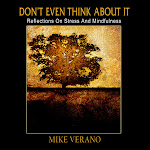 It is not death that a man should fear, but he should fear never beginning to live.
It is not death that a man should fear, but he should fear never beginning to live.Marcus Aurelius
I have read many stories of people who, after brushes with death, report that they emerge with a new consciousness, an awakened state in which everything seems to fit into place and make perfect sense. Their stories are filled with such hope, such intense understanding of life, that I could only think, “I gotta get me some of that.”
Like most people, I have never faced the great white light of a near-death experience. I have, however, seen the faint glimmer of a near-life experience. This is a nagging sense that one is almost there, just a step away from personal fulfillment and only a few short steps from the Promised Land. However, it is never close enough and one’s days are spent lamenting a life almost lived to the fullest, dreams almost made real and the desire to be the most sought after, well-liked person in the known solar system left unfulfilled.
Where is our enlightenment? When does the awakening take place for those of us who spend more time in the “ditch often occupied” than the on “the road less traveled?” Sure if you spent an evening hovering over your body while the EKG machine flat lined, and then were able to return to tell your loved ones that you heard every word they said about how you should have exercised more, you might have a new outlook on existence. But what if the only out of body experience you ever had was followed up by a smashing hangover and your only contact with nirvana was a concert you went to years ago that left you thinking, “what are they so angry about?”
Prior to Buddhism, there were two primary roads that one could travel down in search of higher planes of existence. One was hedonism and the other asceticism. With the first you flood the senses with all the earthly delights you can stand in hopes of reaching ecstasy. With the other you inflicted suffering on yourself in hopes that you could break down your human trappings and discover the divine truth hidden underneath. Both paths came with pitfalls, but my choice would have been the unending pleasure-fest.
The Buddha’s great insight was that neither road was necessary and both actually had at their core the problem of desire, even if that desire was to renounce all earthly treasures, in the case of asceticism, in order to get a payoff from the Supreme Being. The Buddha pointed out that somewhere between these two extremes was a middle path that was the natural course that life takes. Simply living in accord with life and not fighting it brings one back to the natural state of enlightenment. The image often used is that of a river taking the path of least resistance back home to the sea.
In the end it is not gorging on life or coming close to death that wakes us out of our misery, it is living life mindfully, being totally in the here and now and not allowing our thoughts and desires to run the show. To reach this state of deep peace within ourselves does not require an out of body experience, but you will have to get out of your mind. This will feel like death to the ego so don’t be surprised if you hear its shrill voice calling, “stay away from the light, don’t go towards the light!”








